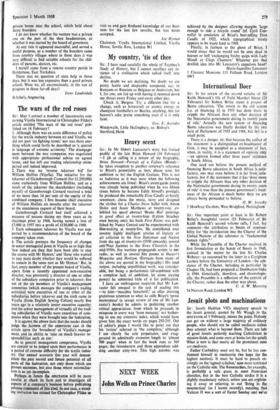The wars of the red roses
Sir: May I correct a number of inaccuracies con- cerning Viyella International in Christopher Fildes's article entitled 'The wars of the red roses' pub- lished on 16 February?
1. Although there was an acute difference of policy for the textile industry between la and Viyella, we did not part 'on fighting terms,' nor was there any- thing which could fairly be described as 'a quarrel in language of extreme acrimony.' The disengage- ment between the two companies was negotiated with appropriate professional advice on agreed terms, and has left our trading relationship unim- paired and indeed improved.
2. There was no 'reverse takeover bid' for William Hollins (Viyella). The initiative for the takeover of Gainsborough Coward (for f 1,250,000) came exclusively from William Hollins, and as a result of the takeover the shareholders (including myself) of Gainsborough Cornard received a total of no more than 14 per cent of the equity of the combined company. I first became chief executive of William Hollins six months after the takeover at the unanimous request of their board.
Gainsborough Cornard had itself achieved a measure of success during my three years as its chairman prior to 1960, having turned a loss of £7,000 in 1957 into a profit of £130,000 in 1960.
3. Each subsequent takeover by Viyella was sup- ported by a recommendation of the board of the company taken over.
4. The article portrays the frequency of changes in senior managerial posts in Viyella as so high that 'few indeed are they that have been able to stay the course with Mr Hyman,' and 'those who wanted to stay must doubt whether they would be suffered to remain in the same nest as Mr Hyman.' But, in fact, every member of the present board of Viyella, apart from a recently appointed non-executive director, was previously a director of one or other of the subsidiary companies prior to takeover; five out of the six members of Viyella's management committee (which manages the company's trading activities) were executives of one or other of the subsidiaries before takeover and the sixth came to Viyella (from English Sewing Cotton) nearly five years ago in a relatively junior executive capacity; and the senior management of virtually all the trad- ing subsidiaries of Viyella were executives of com- panies when they were brought int)) the federation. It is against the above facts that the reader should judge the fairness of the aspersions cast in the article upon the 'broadness' of Viyella's manage- ment, and its ability to 'take on much heavier re- sponsibilities such as ESC.'
As to general management competence, Viyella are content to be judged upon their performance in a period of extreme difficulty for the textile indus- try. Our annual accounts this year will demon- strate the past record and future potential of all Parts of the federation, not only those which are proven successes, but also those where rationalisa- tion is as yet incomplete. Perhaps in future the SPECTATOR will be more careful to check its facts and to investigate all aspects of a company's business before publishing adverse comments of this kind. In out case, a stand- ing invitation has existed for Christopher Fildes to visit us and gain firsthand knowledge of our busi- ness for the last few months, but was never accepted.
Joe Hyman Chairman, Viyella International Limited, Viyella House, Saville Row, London WI


































 Previous page
Previous page